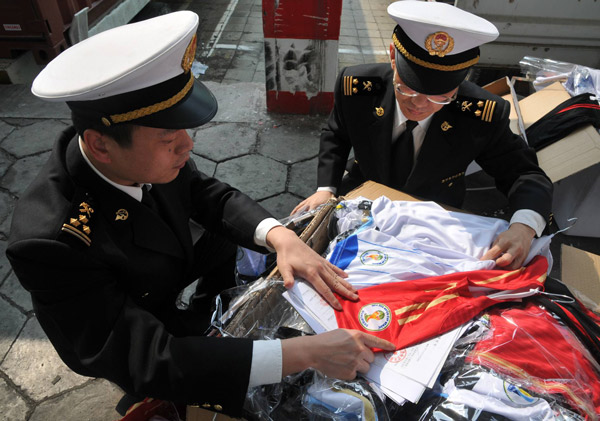China Customs seize fake products to protect World Cup
ZHANG FAN in New York
| China Daily USA | Updated: 2014-04-28 04:50
|
 |
|
Xiamen Customs seized 21,648 fake 2014 FIFA World Cup Brazil jerseys on April 9. It was the first copyright infringement case to occur in Xiamen since the General Administration of Customs launched a campaign fighting IP infringement related to the World Cup. [Pu Yunru /for China Daily] |
China's recent seizures of fake export products related to the 2014 FIFA World Cup in Brazil show it is determined to protect intellectual property and that China "wholeheartedly" supports Brazil's World Cup effort, an expert says.
"April 26 is the 14th World Intellectual Property Day. Protecting the intellectual property of the World Cup can benefit the long-term development of the China-Brazil economic relationship," said Zhou Xinyu, a researcher at Beijing Foreign Studies University. "If the flow of fake products seriously affected the local market, Brazil would question its ties with China."
Earlier this month China Customs authority launched the "Greenery Action" campaign to fight intellectual property infringement of the World Cup. It will continue until the end of July.
Under that effort, customs officers in Xiamen, a major international port located in the southeastern China, seized 21,648 football jerseys with FIFA World Cup and "FAIR PLAY" logos on them, worth more than 730,000 yuan ($116,731).
In Ningbo, East China, more than 8,760 fake World Cup footballs with the same color design with World Cup official football named "Samba Glory" that were to be exported to Columbia were seized. Several days later, customs officers in Yiwu, Zhejiang province found a total of 1,020 actual-size but unauthorized World Cup soccer trophies to be exported to Libya.
In the first quarter of 2014, China Customs officers in more than 10 coastal cities, including Shenzhen, Qingdao and Guangdong, seized 6.59 million pieces of unauthorized products related to the World Cup. The fake products will be destroyed.
Zhou said Brazil's 2014 World Cup is a great opportunity for the development of the country's local manufacturing industry, and for Chinese companies to show the world its achievements in manufacturing. "It would be a shame if we miss this chance because of infringement products," he said.
Ford Brand Management Co Ltd based in Hangzhou province signed a World Cup mascot license agreement with FIFA, covering all regions around the world except Brazil for the production of 3D dolls, key chains, party products and automobile accessories. Several other Chinese companies are also authorized by FIFA to produce products related to the World Cup.
"China's action in protecting intellectual property also protect the development of our own companies, especially the ones in cultural and technology industry," Zhou said.
China joined the World Intellectual Property Organization in 1980, and two years later established its first trademark law, the foundation of China’s modern intellectual property legal system. Now China has a complete legal system to protect intellectual properties, including copyright, patent and computer software.
According to China's State Administration for Industry and Commerce, China registered almost 4 million trademarks by the end of 2009, the most in the world.
However, in the annual report of the 2013 Social Satisfaction towards Intellectual Property Protection released on April 25 by the Chinese government, people's satisfaction rate toward IP protection was higher than their evaluation for law enforcement work.
"It is right for the Chinese government to tackle the infringement of intellectual products," said Zhou, "China needs to realize industrial restructuring through developing our own brands. We have already gained advanced technologies, all we need now is to encourage the companies with independent intellectual property to develop."
"It will take a long time to finally achieve the goal because the whole society, not just the government, needs to realize such importance," he added.




















